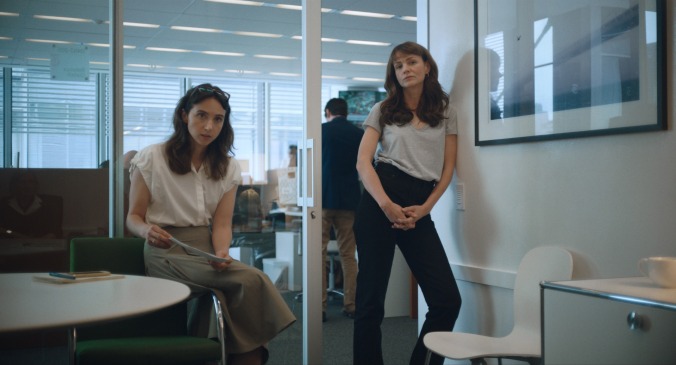She Said revisits Hollywood's Harvey Weinstein reckoning without saying anything new
Despite impassioned performances by Zoe Kazan and Carey Mulligan, Maria Schrader's dramatization of the real-life Weinstein investigation feels like old news

After the story of film producer Harvey Weinstein’s long career of sexual harassment and assault shook Hollywood to its core, it was an inevitability that a film like She Said would come along to process the airing of the film industry’s disturbing open secrets. This isn’t to say that director Maria Schrader and screenwriter Rebecca Lenkiewicz’s approach to adapting Jodi Kantor and Megan Twohey’s 2017 New York Times investigation into Weinstein comes across as cynical or devoid of reverence for the gravity of what it depicts. Quite to the contrary, the film is grave and sometimes harrowing. However, they struggle to find a point to their film beyond the rote demonstration of investigative procedure, leaving She Said as something of an obligatory footnote instead of a real driver of cultural dialogue.
Kantor (Zoe Kazan) and Twohey’s (Carey Mulligan) previous reporting on sexual harassment leads them to allegations against producer Harvey Weinstein within the film industry, stemming from actress Rose McGowan (voiced on the phone by Keilly McQuail). Backed up by editors Rebecca Corbett (Patricia Clarkson) and Dean Baquet (Andre Braugher), the reporters follow threads to many of Harvey Weinstein’s former employees, dating back to the 1990s, though almost all are reticent to speak out, many hinting at legal ramifications for doing so. This eventually unravels Weinstein’s pattern of inappropriate behavior, hidden under nondisclosure agreements and propped up by a network of enablers.
As a journalistic procedural, She Said is certainly functional, building a story from the tension of uncovering sources and convincing them to provide information and, hopefully, to have them speak on the record, in spite of the serious potential social and legal cost of doing so. This is a film about conversations in diners and restaurants, phone calls and surprise house calls, hunts for evidence that corroborates what is known intuitively. Schrader’s direction is restrained and respectful to the gravity of its subject matter, allowing the inherent drama to do most of the heavy lifting and Nicholas Britell’s excellent score to pick up any slack.
The closest the film comes to any sense of stylistic flourish is in its depiction of Harvey’s victims’ accounts, particularly in monologues performed by talented actresses such as Jennifer Ehle and Angela Yeoh. These emotional recountings are accompanied by flashbacks that carefully eschew direct representations of the horrific events that Laura Madden and Rowena Chiu, respectively, went through. Instead, these moments in time are shown mostly through static, lifeless details of the environment in which their dignity was violated—the liminal space of a hotel hallway, the running water of a shower glimpsed through a doorway, clothes rumpled on the floor—and any shots that depict the women themselves are reflections of their emotional states, not the tragedies that befell them. This makes for powerful imagery when accompanied by the appropriate context, and it’s these scenes that almost give the film a sense of unique identity.
Despite this, She Said never really finds much of a purpose to its dramatization of Kantor and Twohey’s investigation. There seems to be little to be said from having actors depict the investigation that is not blatantly clear from the well-known events and results of the investigation itself, and while it is certainly commendable to resist an exploitative descent into melodrama—2019’s similarly-themed Bombshell comes to mind—there’s a pervasive sense that this dramatization is grasping to say more than its modest docudrama structure will allow.
This is most evident in minor moments depicting Kantor and Twohey’s home lives, which make up the bulk of Kazan and Mulligan’s dramatic work in the film. Whether Kantor’s young daughter is surprising her by knowing the word “rape,” her husband is complaining about work without inquiring about his wife’s stressful day, or Twohey is grappling with postpartum depression, these moments are affecting in isolation but do little to substantively add to the overarching themes of women’s compelled silence in the face of men’s sexual entitlement. There is a compellingly naturalistic chemistry between Kazan and Mulligan as the reporters develop a bond of their shared pursuit of the truth, but these character beats are, at best, a garnish on the side of a relatively bland meal.
That makes it difficult to really evaluate who exactly She Said hopes to find as its audience. The results of the Weinstein investigation and the #MeToo movement it helped spark have become formative, known events of recent history even for those who did not know Weinstein’s name before, so it’s hard to imagine what value the filmmakers hoped to add with such a rote procedural, as competently made as it may be. Perhaps She Said will age well for future audiences looking back on this moment in time, but here and now it feels like Kantor and Twohey’s reporting does just fine speaking for itself.